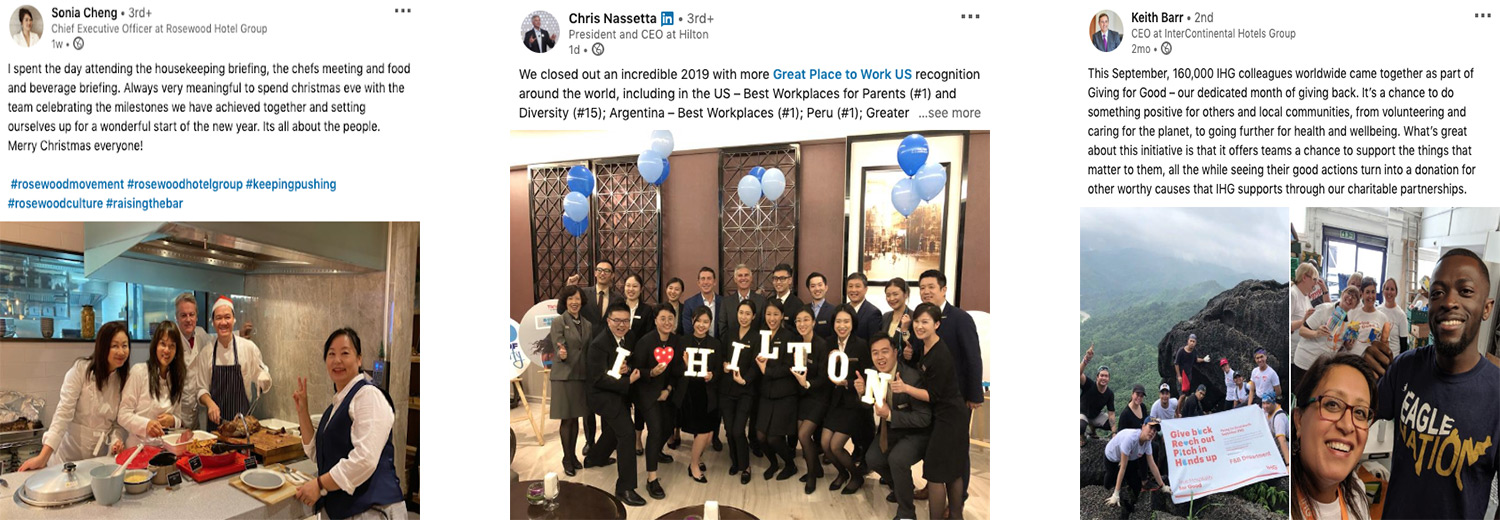Hotel CEOs are in heavy social media, public relations mode. But this time it’s less about promoting their brand designs, signature beds or celebrity chefs. For the first time since 2000, it’s about attracting and retaining talent. Hotel CEOs, who are mostly deal-makers with real estate DNA rather than operators, are going big with social media campaigns centered on recognizing hotel workers and promoting their work cultures.

Source: Linkedin
However, the latest propaganda doesn’t seem to be working because a different type of disruption is at work. Talent is seeing through it and know the corporate posture is decidedly reactive and self-serving. Talent has democratized and is voting against a career in hospitality with their feet. And it’s happening all over the world.
The current hospitality workforce gap has reached unprecedented levels, with the U.S. Bureau of Labor Statistics estimating that there were more than a million job openings within the leisure and hospitality sector in 2018 versus over 350,000 job openings in 2009.
The Talent Disruption – Key Facts
This talent disruption is putting at risk the growth of one of hospitality, the world’s biggest industries that represents over 300 million employees or 10% of Global GDP. For hotel brands and their developers, the timing could not be worse. Hospitality is forecast to add another 5 million jobs in the next decade to support a record global pipeline of over 10,000 hotel openings, from China, the UK and Germany to the Middle East and China.
Hospitality is the 2nd fastest growing U.S. job market in 2019. Hotels represent 15 million jobs of which 6 million annual job openings from annual turnover. According to the Deloitte 2019 Travel and Hospitality Industry Outlook, the current hospitality workforce gap has reached unprecedented levels, with the U.S. Bureau of Labor Statistics estimating that there were more than a million job openings within the leisure and hospitality sector in 2018 versus over 350,000 job openings in 2009. In terms of housekeepers alone, this equates to another 10,000 to 13,500 new employees a year just to clean the rooms. Average annual wage increases in the hotel industry surpassed 4%, compared to a national average wage increase of 2.8% in 2018, according to data from the Bureau of Labor and Statistics.
This talent disruption comes amidst a record hotel pipeline with over 5,647 U.S. hotels opening in the next 3 years.
The situation has been further exacerbated by the Trump administration’s tightening of immigration policies. While immigrants make up about 13% of the total U.S. population, the segment accounts for a highly significant 31% of the hotel industry’s workforce. Furthermore, this talent disruption comes amidst a record hotel pipeline with over 5,647 U.S. hotels opening in the next 3 years.
Countries such as Canada, Australia, Germany, the UK and Japan are facing similar challenges in attracting talent into the hospitality sector, with an estimated combined 1 million jobs unfilled and growing, amidst a wave of hotel openings in the next few years. Canada and Australia each have over 100,000 unfilled positions in hospitality with job growth in the sector well above 25% in the next 5 years. In Germany, a country on track for its 10th straight year of growth in overnight stays, more than two-thirds of hoteliers identified the scarcity of skilled staff as their biggest problem.
Kate Nicholls, Chief Executive of Hospitality UK, recently said: “what makes Brexit so worrying for hospitality is not skill shortages, not a failure to upskill our workers, but simply a shortage of bodies available.” Japan is now implementing a plan to allow foreign nationals to apply for a technical internship training program, as part of a new blue-collar work visa program, that allows them to stay employed for a hotel for up to 5 years.
But wait, is this just the result of another economic or real estate cycle and therefore a temporary headwind facing the industry? And why should customers, investors, brands and managers care?
The talent disruption is real. It is not just a cyclical insurgency. The market forces driving this disruption are structural and long-term.
The Hospitality Talent Crisis is a Long-Term Disruption, Not a Short-Term Insurgency
Let’s take a step back. Research proves that the “service profit chain,” which measures the relationship between employee engagement, customer satisfaction and profits, is proven to work in hospitality, airlines, financial services and other service industries. In other words, in hospitality, changes in employee satisfaction and engagement directly impact revenues and the bottom-line, very quickly.
For a variety of reasons over the past decade, in many service industries, the service profit chain is broken. And hotels, which have largely withstood automation and shifts to ecommerce, is perhaps the most broken of them all. Employee turnover is at record highs, surpassing 50% in full-service hotels in major markets and travel review sites have exposed service problems. Among the major hotel brands, only Marriott has been bold enough to even feature reviews on their own site but does not permit travelers to share real photos.
The talent disruption is real. It is not just a cyclical insurgency. The market forces driving this disruption are structural and long-term.
As a traveler, the talent disruption means fewer staff at hotels, declining service levels from disengaged employees and broken brand promises. It means the traveler will get less value for their money and will be more likely to make fewer trips and do their meetings on zoom.com or rent an Airbnb instead of a hotel suite on their next vacation.
The talent disruption is real. It is not just a cyclical insurgency. The market forces driving this disruption are structural and long-term. They include the divestment of operations by brands resulting in increased franchising and the growth of 3rd party management companies, the growing power of private equity real estate investors who seek to squeeze out more profits, changing attitudes towards work among 18-30 year old’s and unforeseen geo-political constraints such as anti-immigration sentiments.
Research supports that Milennials, which comprise 75 million or roughly half the workforce in the U.S., seek out employers that have a social purpose, seek more of a work/live balance and far are more likely to change jobs, costing the U.S. economy $30 billion a year. The generational shift in work attitudes is a contributing factor in markets such as the U.S.
In the long run, the way brands are created will have to evolve from real estate driven to people and service driven.
Hospitality has become a less attractive employer with higher turnover, relatively low wages and fewer opportunities for career progression. And for many it’s an industry with a glass ceiling. Women and minorities represent most of the workforce but only a minority of property executives and a tiny fraction of corporate executives.
As a result of these underlying drivers, the world’s second largest industry is facing record labor shortages around the globe. 18-30-year-olds are less actively seeking employment or careers in the hospitality industry. They are even giving up health care benefits and a career path to drive an UBER, host an Airbnb and freelance on Upwork.
So, for those industry leaders including hotel owners, operators, and brands who get it and are willing to do more than public relations campaigns, what can be done? A return to the fundamentals to address compensation, organization and roles and new brand standards for investing in people. In the long run, the way brands are created will have to evolve from real estate driven to people and service driven.
To address the talent crisis, hospitality leaders must spearhead change in the following five areas:
- Compensation: Pay People What They Are Worth and Align Long Term Interests
- Organization: Reinvent Property Structures and Empower Employees
- Product Development: Create Compelling Experiences Not Real Estate Brands
- Learning: Invest in New Platforms to Grow the Talent Pool
- Technology: Humanizing Travel With Automation (Bring it On!)
In this series on the Talent Crisis in Hospitality we will take a closer look at how the proposed change initiatives can address the root causes of the talent disruption.



